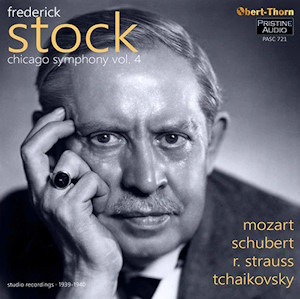
Frederick Stock (conductor)
Chicago Symphony Volume 4
rec. 1939-40, Orchestra Hall, Chicago
Pristine Audio PASC721 [2CDs: 145]
This series continues to show that Frederick Stock delivered high quality recordings in Chicago that were routinely underrated by contemporary American critics fixated on Koussevitsky and Stokowski. Underrated or maybe denigrated. The lure of the chromium plate and the Eastern European surname – notwithstanding that Stokowski was British – seemed inevitably to downgrade the Teutonic Stock to also-ran status, along with his orchestra, but the recordings tell a somewhat different story, especially in these fine transfers, largely taken from good-sounding LPs of the early 1950s.
Take Stock’s 1939 recordings of The Nutcracker Suite, Op.37a which was soon critically eclipsed by the recording of yet another Eastern European martinet, Rodzinski and his New York Philharmonic Symphony forces. Stock recorded for Columbia and one needed sharp elbows when one was in competition with Victor artists such as Ormandy and Stokowski, both of whose Tchaikovsky Philadelphia recordings were in the catalogue at the same time as Stock’s. It was a forgone conclusion that Stock would suffer by comparison, but his recording is perceptive and well played. It was Stock who laid the groundwork in Chicago, as the critic Claudia Cassidy lamented on his death, Kubelík who steadied the ship and Reiner who reaped the plaudits.
Mozart’s ‘Prague’ Symphony is excitingly played and comes complete with Stock Luftpausen, as Mark Obert-Thorn observes in his one-page note, a hangover from his earlier practice but one clearly with which persisted to his dying day. There are some slides in the slow movement too, which I find attractive and which warms the music considerably and if the performance doesn’t match those of Beecham or Walter, it offers a healthy alternative. Also Sprach Zarathustra was recorded in January 1940 but the domestic American catalogue downplayed it in favour of Koussevitzky’s Boston recording, critics grudgingly reporting that though Stock played the lyric sections convincingly, it was Boston’s virtuosity that elevated its recording. All the early commercial recordings of this work were made in America, possibly for its orchestras’ virtuosic orchestral playing. Concertmaster John Weicher takes solo responsibilities as he was later to do for Rodzinski and Reiner.
The second disc of this twofer offers one major work and some smaller ones. I would admit that The Swan of Tuonela (with Robert Mayer playing the cor anglais) is rather penny plain and that Ippolitov-Ivanov’s Procession of the Sardar lacks the tonal splendour of Stokowski though the Danse Macabre, with Weicher, is perfectly fine and Weber’s Euryanthe overture also decent – though it lacks the vitality of the slightly earlier 1937 Boult-BBC Symphony recording. The main event on CD2, however, is Schubert’s ‘The Great’, recorded in January 1940, a lively and buoyant reading that’s well played by the orchestra and comes with seamless side joins courtesy of the transferring process. Perhaps some elements are downplayed – I’m thinking of the trumpets at the conclusion of the first movement – but overall it’s a more than competent performance, unfortunate enough to come into direct competition with Bruno Walter’s New York reading and Adrian Boult’s earlier BBC one.
Volume 4 keeps up the high remastering standards already established in this absorbing study of an unjustly neglected body of recordings.
Jonathan Woolf
Availability: Pristine Classical
Contents
Pyotr Ilych Tchaikovsky (1840-1893)
Nutcracker Suite, Op.71a (1892)
Wolfgang Amadeus Mozart (1759-1795)
Symphony No.38 in D major, ‘Prague’ K.504 (1786)
Richard Strauss (1864-1949)
Also Sprach Zarathustra, Op.30 (1896)
Jean Sibelius (1865-1957)
Lemminkäinen Legends: The Swan of Tuonela, Op.22 (1893/1897/1900)
Mikhail Ippolitov-Ivanov (1859-1935)
Caucasian Sketches: Procession of the Sardar, Op.10 (1894-96)
Camille Saint-Saëns (1835-1921)
Danse Macabre (1874)
Carl Maria von Weber (1786-1826)
Euryanthe overture (1823)
Franz Schubert (1897-1828)
Symphony No.9 in C major ‘The Great’, D.944 (1839)


















